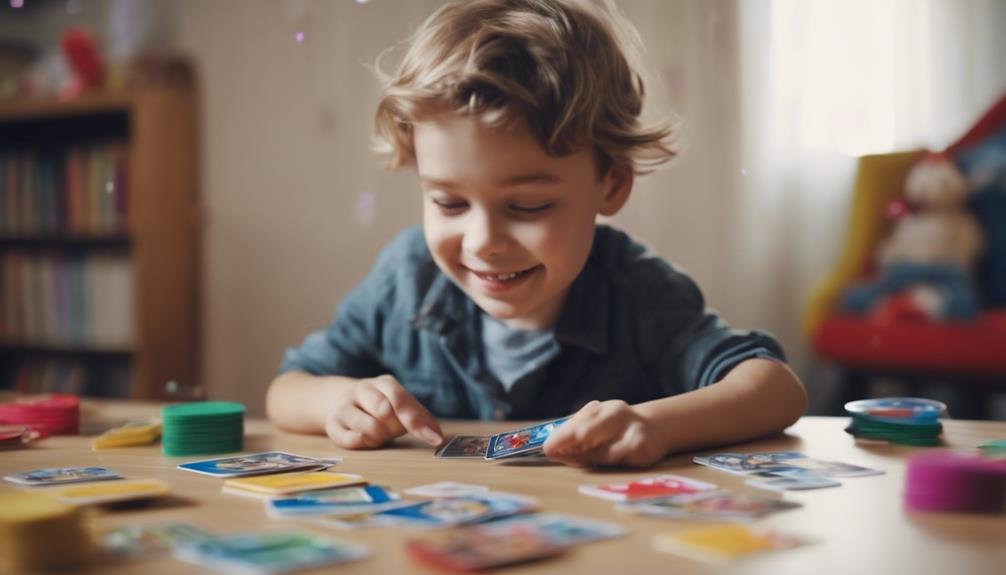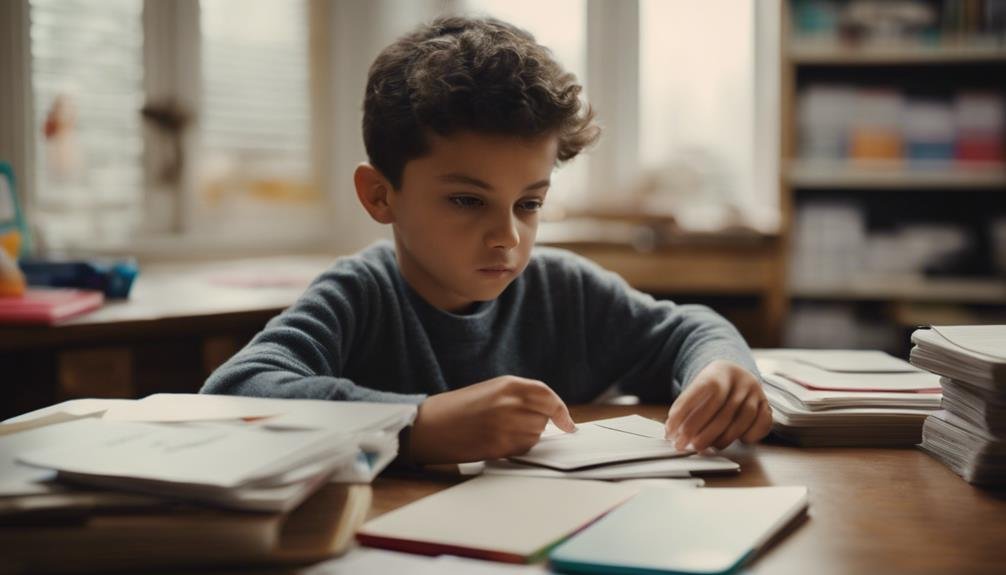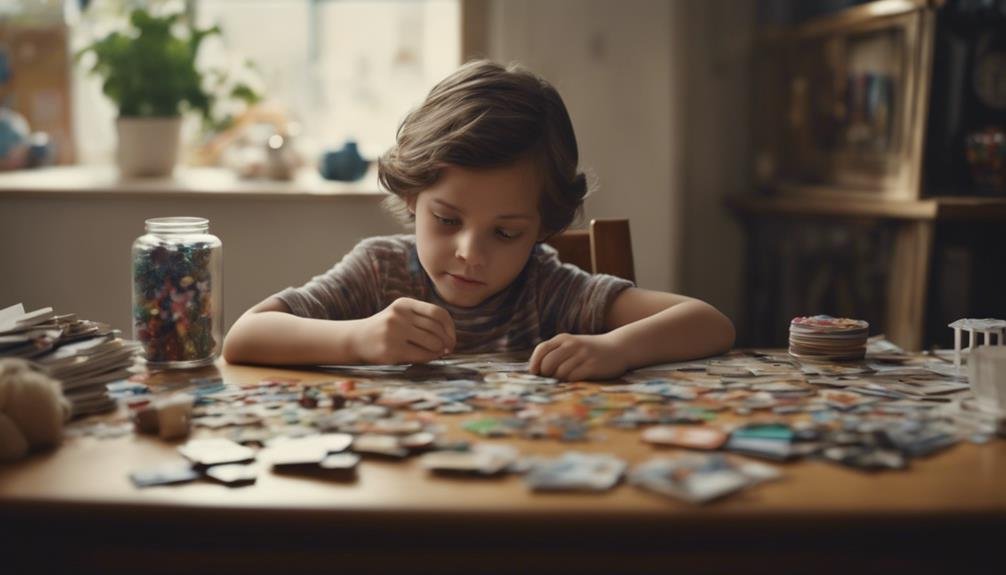When it comes to boosting your child's memory skills, there are practical strategies that can make a real difference in their learning journey.
From engaging memory-boosting games to incorporating music and rhymes, there are various techniques you can implement to enhance your child's ability to retain information effectively.
By exploring these tried and tested methods, you might uncover valuable insights into how memory skills can be nurtured and improved over time.
Key Takeaways
- Engage in memory games and puzzles to boost cognitive abilities.
- Use visualization and mindfulness techniques to enhance memory retention.
- Practice repetition and healthy habits for improved memory skills.
- Implement memory techniques and celebrate small victories for cognitive development.
Memory-Boosting Games

To enhance your child's memory skills, engaging in memory-boosting games can be a highly effective strategy. Memory building exercises and interactive games offer fun memory drills and engaging challenges that can greatly improve your child's cognitive abilities. Research has shown that such activities not only enhance memory retention but also boost concentration and cognitive processing speed.
Engaging your child in memory-boosting games like memory matching, word recall, or puzzle-solving can help stimulate different areas of the brain responsible for memory formation. These games provide mental stimulation, encouraging the brain to create new neural pathways and connections, ultimately strengthening memory functions.
Visualization Techniques
Engaging in visualization techniques has been shown to greatly enhance memory retention and cognitive processing in children. Creative visualization involves actively creating vivid mental images to aid in remembering information. This technique taps into the brain's natural ability to remember images more easily than words, making it a powerful tool for boosting memory skills.
Memory mapping is another effective visualization technique where children create a visual representation of information they need to remember. By organizing concepts spatially and connecting them with lines or colors, memory mapping helps children see the relationships between different pieces of information, making it easier to recall them later.
Incorporating visualization techniques like creative visualization and memory mapping into your child's learning routine can significantly improve their memory skills. Encourage your child to engage in these practices regularly to enhance their memory retention abilities and cognitive processing.
Repetition and Practice

Utilizing repetition and consistent practice plays an important role in solidifying your child's memory retention and enhancing their cognitive abilities. Research has shown that repeated exposure to information helps embed it into long-term memory, leading to improved recall ability. When your child engages in regular practice sessions, whether it's through daily quizzes, review exercises, or interactive games, they strengthen the neural pathways associated with memory retention.
By incorporating repetition into your child's learning routine, you're basically reinforcing the connections in their brain that are responsible for storing and retrieving information. This process not only enhances their memory retention but also boosts their overall cognitive functions. With each practice session, your child's brain becomes more adept at encoding and recalling details, fostering a significant improvement in their ability to retain and retrieve knowledge.
Encouraging your child to engage in repeated practice not only solidifies their memory but also cultivates a disciplined approach to learning. Whether it's revisiting previous lessons, practicing specific skills, or reviewing key concepts, incorporating repetition and practice into their daily routine can greatly enhance their memory retention and recall improvement.
Mindful Learning Activities
Incorporating mindfulness into learning activities enhances your child's cognitive development and memory retention. Engaging in mindful reflection and cognitive exercises can greatly improve your child's memory skills.
Here are three effective strategies to incorporate mindful learning activities into your child's routine:
- Mindful Breathing Exercises: Encourage your child to take a few moments to focus on their breath. This simple practice can help improve concentration and reduce stress, ultimately enhancing memory retention.
- Mindful Observation: Encourage your child to engage in activities that promote mindful observation, such as nature walks or art appreciation. This practice can enhance their ability to detail-oriented tasks, which is vital for memory recall.
- Mindful Listening: Encourage your child to actively listen during conversations or while engaging with audio materials. This practice can improve their auditory processing skills, leading to better memory retention of spoken information.
Incorporating these mindful learning activities into your child's routine can have a significant impact on their cognitive development and memory skills.
Healthy Lifestyle Habits

A healthy lifestyle, characterized by consistent exercise and balanced nutrition, plays a significant role in optimizing cognitive function and memory retention in children. Nutritional benefits are essential for brain development and memory enhancement. Foods rich in omega-3 fatty acids, such as fish, nuts, and seeds, are known to support brain health and improve memory. Additionally, incorporating fruits, vegetables, whole grains, and lean proteins into your child's diet can provide vital nutrients that fuel cognitive processes and enhance memory capacity.
Physical exercise is equally vital for boosting memory skills. Engaging in regular physical activity increases blood flow to the brain, which can improve concentration, focus, and memory retention. Encourage your child to participate in activities they enjoy, whether it's playing sports, dancing, or simply going for a walk. Even moderate exercise has been shown to have a positive impact on memory function.
Encouraging Active Listening
To enhance your child's memory skills, fostering active listening is an important aspect that can greatly impact their cognitive development and retention capabilities. Active listening involves more than just hearing; it requires engagement, focus, and understanding.
Here are three effective strategies to encourage active listening in your child:
- Interactive Reading: Engage your child in interactive reading sessions where you take turns reading aloud and discussing the story. Encourage them to ask questions, make predictions, and connect the text to their own experiences.
- Memory Journaling: Encourage your child to keep a memory journal where they can write about their day, reflect on important events, and jot down key takeaways from their learning experiences. This practice not only enhances their memory skills but also improves their ability to articulate thoughts.
- Reflective Conversations: After any learning activity or experience, engage your child in reflective conversations. Encourage them to summarize what they've learned, ask open-ended questions, and express their opinions. This process reinforces memory retention and deepens their understanding of the subject matter.
Mnemonic Devices Exploration

Exploring mnemonic devices can greatly enhance memory retention and cognitive recall in children by providing effective memory aids and strategies. These memory aid strategies offer valuable memory technique tips that can benefit your child's learning process. Mnemonic devices come in various forms, such as acronyms, visualization techniques, or rhymes, all designed to help encode information in a way that's easier to remember.
Engaging in memory improvement exercises can further solidify these techniques. Encourage your child to practice these memory recall techniques regularly to strengthen their memory skills. For instance, they can use mnemonic devices to remember lists, historical dates, or scientific concepts more efficiently.
Creating Memory Palaces
Engaging in the technique of creating memory palaces can greatly boost your child's memory retention and cognitive abilities by harnessing spatial memory for enhanced information recall. Memory palaces are a powerful mnemonic device that leverages spatial organization and mental associations to help your child remember vast amounts of information more effectively.
Here's how you can create memory palaces to enhance your child's memory skills:
- Choose a Familiar Place: Encourage your child to select a familiar location, such as their bedroom or a favorite park, to serve as the foundation for their memory palace.
- Assign Information to Specific Locations: Have your child mentally place the information they want to remember at various spots within the chosen location, linking each piece of information to a specific object or area in their memory palace.
- Practice and Review: Encourage your child to mentally walk through their memory palace regularly, reinforcing the associations between the information and the spatial cues to improve retention and recall.
Setting Up Memory Challenges

Utilizing structured memory challenges can effectively enhance your child's cognitive abilities and memory retention through targeted exercises and tasks. Memory puzzles and memory journals are valuable tools in setting up memory challenges for your child. Memory puzzles, such as crossword puzzles or memory matching games, can engage your child's brain in a fun yet challenging way, improving their memory recall and problem-solving skills.
Encouraging your child to keep a memory journal where they write down important events or information can also help strengthen their memory retention by reinforcing the act of recalling and recording details.
Incorporating memory challenges into your child's routine through various memory exercises can provide them with a consistent opportunity to practice and enhance their memory skills. These challenges can range from simple tasks like memorizing a list of items to more complex activities like memorizing sequences or patterns. By consistently engaging your child in memory challenges and exercises, you can support their cognitive development and boost their memory retention capabilities effectively.
Incorporating Music and Rhymes
Incorporating music and rhymes into memory challenges can greatly enhance your child's cognitive development and memory retention abilities. Research suggests that music and rhymes engage multiple areas of the brain, helping to solidify memories more effectively.
Here are some ways you can leverage musical mnemonics and rhyme reminders to boost your child's memory skills:
- Musical Mnemonics: Encourage your child to create songs or jingles that contain important information they need to remember. The melody can help encode the information in a more memorable way.
- Rhyme Reminders: Utilize rhymes or chants to help your child recall specific details or sequences. Rhymes have a natural rhythmic pattern that can aid in memory retrieval.
- Melodic Memory, Rhythmic Recollection: By associating information with melodies and rhythms, your child can tap into melodic memory and rhythmic recollection, making it easier to retrieve stored information when needed.
Incorporating music and rhymes into memory challenges not only makes the learning process more enjoyable but also enhances memory consolidation and recall.
Sleep and Memory Connection

The relationship between sleep and memory is an important aspect of cognitive function that greatly impacts your child's ability to retain and recall information efficiently. Sleep hygiene plays a critical role in memory retention. Ensuring your child has a consistent sleep schedule and a comfortable sleep environment can greatly enhance their memory consolidation process. Research suggests that adequate sleep, particularly during the night, is essential for best cognitive function and memory performance.
Dream cycles also play an important role in memory and cognitive function. During the rapid eye movement (REM) stage of sleep, where most dreaming occurs, the brain processes and stores information from the day. This consolidation of memories during dream cycles is essential for long-term memory storage and retrieval.
Celebrating Small Victories
Celebrating small victories is a proven method to boost motivation and reinforce positive behavior in children, fostering a growth mindset conducive to enhanced learning and memory retention. When implemented effectively, this strategy can have a profound impact on your child's memory skills.
Here are three key ways in which celebrating small victories can benefit your child's memory development:
- Daily Affirmations: Encouraging your child to engage in daily affirmations that celebrate their achievements, no matter how small, can help build their confidence and motivation. By acknowledging their progress, you're reinforcing the idea that their efforts are valued and recognized.
- Progress Tracking: Implementing a system where your child can visually track their progress towards a goal can be a powerful motivator. This method not only allows them to see how far they've come but also provides a sense of accomplishment that can enhance their memory retention.
- Positive Reinforcement and Goal Setting: By tying small victories to rewards and setting achievable goals, you're creating a structured environment that promotes positive behavior. This approach not only boosts motivation but also enhances memory skills by linking success with positive outcomes.
Frequently Asked Questions
How Can I Help My Child Stay Motivated to Consistently Practice Memory-Boosting Techniques?
To help your child stay motivated in consistently practicing memory-boosting techniques, focus on positive reinforcement. Celebrate small wins and offer rewards. Create a routine with consistency, making memory challenges fun and engaging to maintain their interest and commitment.
Are There Any Specific Memory-Boosting Games That Are Especially Effective for Younger Children?
For younger children, memory-boosting games like "Memory Match" and memory boosting apps such as "Lumosity Kids" can be effective. These tools engage kids in fun activities that enhance their memory skills while they play.
How Can I Incorporate Memory-Enhancing Activities Into My Child's Daily Routine Without Overwhelming Them?
To incorporate memory-enhancing activities into your child's daily routine without overwhelming them, start with fun challenges like memory card games or scavenger hunts. Creative exercises such as storytelling or drawing can also boost memory skills effectively.
Are There Any Specific Foods or Supplements That Can Help Improve My Child's Memory?
To boost your child's memory, consider brain-boosting snacks rich in essential nutrients like blueberries, nuts, and seeds. Memory-enhancing supplements containing key vitamins and minerals can also support cognitive performance. Always consult with a healthcare provider before introducing new supplements.
What Are Some Strategies for Helping My Child Retain Information Better During Exams or Tests?
You're prepping for tests? Solid study habits like spaced repetition work wonders. Memory aids, like acronyms or visualization, are your pals. Try cognitive exercises and mindfulness techniques. Rock those exams!
Conclusion
To sum up, by incorporating memory-boosting games, visualization techniques, and repetition into your child's daily routine, you can help enhance their memory skills. Remember, 'practice makes perfect' when it comes to improving memory abilities.
Celebrate small victories along the way, as they're stepping stones to greater success.
With mindful learning activities, healthy lifestyle habits, and a good night's sleep, your child will be better equipped to tackle memory challenges and excel in their cognitive development.




